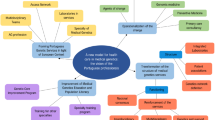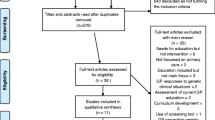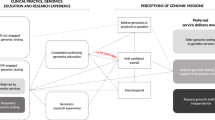Abstract
The UK government announced the establishment of an NHS National Genetics Education and Development Centre in its Genetics White Paper. The Centre aims to lead and coordinate developments to enhance genetics literacy of health professionals. The nursing program takes a strategic approach based on Ajzen’s Theory of Planned Behavior, using the UK nursing genetics competences as the platform for development. The program team uses innovative approaches to raise awareness of the relevance of genetics, working collaboratively with policy stakeholders, as key agents of change in promoting competence. Providing practical help in preparing learning and teaching resources lends further encouragement. Evaluation of the program is dependent on gathering baseline data, and the program has been informed by an education needs analysis. The challenges faced are substantial and necessitate international collaboration where expertise and resources can be shared to produce a global system of influence to facilitate the engagement of non-genetic nurses.




Similar content being viewed by others

References
Ajzen, I. (1991). The Theory of Planned Behavior. Organizational Behavior and Human Decision Processes, 50, 179–211.
Ajzen, I. (2001). Nature and operation of attitudes. Annual Review of Psychology, 52, 27–58.
Ajzen, I. (2002). Perceived behavioral control, self-efficacy, locus of control and the Theory of Planned Behavior. Journal of Applied Social Psychology, 32(4), 665–683.
Armitage, C. J., & Conner, M. (2001). Efficacy of the Theory of Planned Behavior: A meta-analytic review. The British Journal of Social Psychology, 40, 471–499.
Belfield, C., Thomas. H., Bullock, A., Eynon, R., & Wall, D. (2001). Measuring effectiveness for best evidence medical education: A discussion. Medical Teacher, 23(2), 164–170.
Burke, S., & Kirk, M. (2006). Genetics education in the nursing professions: A literature review. Journal of Advanced Nursing, 54, 228–237.
Burton, H. (2003). Addressing genetics, delivering health. A strategy for advancing the dissemination and application of genetics knowledge throughout our health professions. Public Health Genetics Unit: Cambridge.
Cangelosi, P. R., & Whitt, K. J. (2006). Teaching through storytelling: An exemplar. International Journal of Nursing Education Scholarship, 3(1), 1–7.
Department of Health (2003). Our inheritance, our future—Realising the potential of genetics in the NHS. HMSO: London.
Gaff, C. L. (2005). Identifying clients who might benefit from genetic services and information. Nursing Standard, 20(1), 49–53.
Gresty, K., Skirton, H., & Evenden, A. (2007). Addressing the issue of e-learning and online genetics for health professionals. Nursing & Health Sciences, 9(1), 14–22.
Hunter, L. P., & Hunter, L. A. (2006). Storytelling as an educational strategy for midwifery students. Journal of Midwifery & Women's Health, 51(4), 273–278.
Kern, D. E. (1998). Curriculum development for medical education: A six-step approach. Baltimore: John Hopkins University Press.
Kirk, M. (1999). Nurse education and the new genetics: Preparing the practitioners of the future. University of Glamorgan: Pontypridd.
Kirk, M., McDonald, K., Longley, M., & Anstey, S. (2003). Fit for practice in the genetics era: A competence based education framework for nurses, midwives and health visitors. Report to Department of Health. University of Glamorgan: UK.
Kirk, M., & Tonkin, E. (2006). Genetics education for nursing professional groups: Survey of practice and needs of UK educators in delivering a genetics competence framework. Pontypridd: University of Glamorgan, 1-84054-147-4.
Kirk, M., Tonkin, E., & Birmingham, K. (2007) Working with publishers: A novel approach to ascertaining practitioners’ needs in genetics education. Journal of Nursing Research, 12(6), 1–19.
Kirkpatrick, D. L. (1967). Evaluation of training. In R. L. Craig & L. R. Bittel (Eds.), Training and development handbook (pp. 87–112). New York: McGraw-Hill.
McGregor, S. (2005). Integrating the new genetics into health education practice: Exploring the challenges for midwives, nurses and health visitors in primary care. MPhil Thesis, University of Glamorgan: UK.
Michie, S., Dormandy, E., French, D., & Marteau, T. (2004). Using the Theory of Planned Behavior to predict screening uptake in two contexts. Psychology and Health 19(6), 705–718.
Norman, P., & Hoyle, S. (2004). The Theory of Planned Behavior and breast self-examination: Distinguishing between perceived control and self-efficacy. Journal of Applied Social Psychology, 34(4), 694–708.
Prows, C. A., Glass, M. J., Nicol, N., Skirton, H., & Williams, J. (2005). Genomics in nursing education. Journal of Nursing Scholarship, 37(3), 196–202.
Puffer, S., & Rashidian, A. (2004). Practice nurses’ intentions to use clinical guidelines. Journal of Advanced Nursing, 47(5), 500–509.
Schwartz, M., & Abbott, A. (2007). Storytelling: A clinical application for undergraduate nursing students. Nurse Education in Practice, 7, 181–186.
Thomas, H. (1985). Perspectives on evaluation. In M. Hughes, P. Ribbins, & H. Thomas (Eds), Managing education: The system and the institution. London: Cassell Educational Ltd.
Acknowledgements
The NHS National Genetics Education and Development Centre is funded by the UK Department of Health and Welsh Assembly Government. The contribution of Dr Juping Yu to the literature review is gratefully acknowledged. The authors would like to thank all collaborators who have contributed to the nursing program.
Author information
Authors and Affiliations
Corresponding author
Appendix
Appendix
The UK Nursing Competences in Genetics: 7 Standard Statements
All nurses, midwives and health visitors, at the point of registration, should be able to:
-
1.
Identify clients who might benefit from genetic services and information
-
through an understanding of the importance of family history in assessing predisposition to disease,
-
seeking assistance from and referring to appropriate genetics experts and peer support resources, and
-
based on an understanding of the components of the current genetic counselling process.
-
-
2.
Appreciate the importance of sensitivity in tailoring genetic information and services to clients’ culture, knowledge and language level
-
recognising that ethnicity, culture, religion and ethical perspectives may influence the clients' ability to utilise these.
-
-
3.
Uphold the rights of all clients to informed decision making and voluntary action
-
based on an awareness of the history of misuse of human genetic information and
-
understanding of the importance of delivering genetic education and counselling fairly, accurately and without coercion or personal bias,
-
recognising that personal values and beliefs may influence the care and support provided to clients during decision-making.
-
-
4.
Demonstrate a knowledge and understanding of the role of genetic and other factors in maintaining health and in the manifestation, modification and prevention of disease expression, to underpin effective practice.
-
5.
Demonstrate a knowledge and understanding of the utility and limitations of genetic testing and information
-
including the ethical, legal and social issues related to testing and recording of genetic information and
-
the potential physical and/or psychosocial consequences of genetic information for individuals, family members, and communities.
-
-
6.
Recognise the limitations of one’s own genetics expertise
-
based on an understanding of one’s professional role in the referral, provision or follow-up to genetics services.
-
-
7.
Obtain and communicate credible, current information about genetics, for self, clients and colleagues
-
using information technologies effectively to do so.
-
Rights and permissions
About this article
Cite this article
Kirk, M., Tonkin, E. & Burke, S. Engaging Nurses in Genetics: The Strategic Approach of the NHS National Genetics Education and Development Centre. J Genet Counsel 17, 180–188 (2008). https://doi.org/10.1007/s10897-007-9127-y
Received:
Accepted:
Published:
Issue Date:
DOI: https://doi.org/10.1007/s10897-007-9127-y



